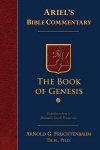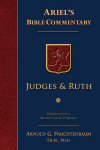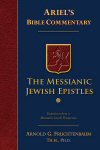Ariel’s Bible Commentary (3 vols.)
Digital Logos Edition
Overview
Years of meticulous study, writing, and editing have produced these remarkable commentaries from messianic studies expert Dr. Arnold Fruchtenbaum.
In the first volume on Genesis, Dr. Fruchtenbaum’s provides the reader an exciting new way to grasp and unlock the richness of this book of the beginnings of all nations, and in particular, the beginning of the nation of Israel.
Dr. Fruchtenbaum’s volume on Judges and Ruth examines Israel’s repetitive cycles of sin, slavery, repentance, and salvation—the narrative that demonstrate the spiritual condition of God’s chosen people.
The third installment of the series highlights the real life concerns of first-century Jewish believers, and deals with issues they wrestled with during the turbulent early years of the church. This volume covers Hebrews, James, 1 and 2 Peter, and Jude.
With Logos Bible Software, these volumes are enhanced with cutting-edge research tools. Scripture citations appear on mouseover in your preferred English translation. Important terms link to dictionaries, encyclopedias, and a wealth of other resources in your digital library. Powerful topical searches help you find exactly what you’re looking for. Tablet and mobile apps let you take the discussion with you. With Logos Bible Software, the most efficient and comprehensive research tools are in one place, so you get the most out of your study.

Key Features
- Provides a Jewish perspective on books of the Bible
- Discusses the origins and characteristics of Israel through its early years
- Presents a look at concerns and issues facing first-century Jewish believers
Product Details
- Title: Ariel’s Bible Commentary
- Author: Arnold G. Fruchtenbaum
- Publisher: Ariel Ministries
- Volumes: 3
- Pages: 1,670
- Christian Group: Judaism
- Resource Type: Commentaries
Individual Titles

In structure, the book of Genesis is a series of 11 family histories compiled and edited by Moses. Throughout the vivid detail provided in Genesis, Dr. Fruchtenbaum’s exegesis allows God’s Word to make its own case for a literal interpretation of the Bible. Dr. Fruchtenbaum’s grammatical, historical-geographical approach to Scriptures from a Jewish perspective provides the reader an exciting new way to grasp and unlock the richness of this book of the beginnings of all nations, and in particular, the beginning of the nation of Israel.
For instance, Dr. Fruchtenbaum brings to life the many genealogies in Genesis as they relate to God’s promises of a Messiah. Genesis makes clear the Messiah would one day come out of Israel to redeem the nation of Israel and to bless all the families of the earth.
Important to understanding one’s relationship to God, Genesis presents four of God’s eight covenants. Three are covenants God made with humanity in general, and these are associated with the familiar stories of Creation, the Fall, and the Flood. The fourth one, an unconditional covenant with Abraham, is the beginning of the story of the nation of Israel, based on God’s promises of descendants and Land to Abraham, Isaac, and Jacob. The account of the nation of Israel that Moses begins in Genesis, he then continues in the four books of the Bible that follow.

Judges and Ruth
- Author: Arnold G. Fruchtenbaum
- Publisher: Ariel Ministries
- Publication Date: 2007
- Pages: 478
The spiritual condition of God’s chosen people during the period of the Judges is summarized by the final verse of the book, “In those days there was no king in Israel; everyone did what was right in his own eyes” (Judges 21:25). Israel’s repetitive cycles of sin, slavery and submission to the gentile peoples in and around the promised land, repentant submission to God, and finally salvation by God’s work through the judges He raised up as deliverers provides the story line in the national incubator prior to the united kingdom of Saul, David and Solomon.
The characters of this exciting time provide the body of Messiah with illustrations pointing to God intervening in the lives of his people when they call upon him. The story of Ruth is a foreshadowing of the Lord’s redemptive plan for all peoples—Jew and Gentile alike.

Years of meticulous study, writing, and editing have produced this remarkable commentary on the Messianic Jewish Epistles (MJE) covering the books of Hebrews, James, I Peter, II Peter, and Jude. The first installment of the Ariel Commentary Series highlights the real life concerns of first century Jewish believers. This important book deals with the issues Jewish believers wrestled with during the turbulent early years of the church. While things in these epistles are applicable to all believers, some are true only of Jewish believers.
With the Mosaic Law now replaced by the law of Messiah, Jewish believers struggled with two major problems: persecution and false doctrine. To deal with the first problem of persecution, Hebrews, James, and I Peter were written. Persecution took place both within the land of Israel and among the Jewish believers of the Diaspora—Diaspora being a technical term for Jews living outside the land of Israel (e.g., James 1:1; I Peter 1:1). The book of Hebrews was written from within the Diaspora in order to deal with the persecution of Jewish believers in the Land of Israel. The epistles of James and I Peter were written in order to deal with the persecution of Jewish believers in the Diaspora; James written from within the land of Israel, and I Peter written from within the Diaspora itself.
To deal with the second problem of false doctrine, two other epistles were written: II Peter and Jude. Second Peter was written from one part of the Diaspora to Jewish believers in another part of the Diaspora. Jude was written from within the land of Israel to Jewish believers in the Diaspora.
This title is included in the following collections
You can save when you purchase this product as part of a collection.
Logos 9 Messianic Jewish Bronz...
$89.99$62.99Logos 8 Messianic Jewish Silve...
$349.99$244.99Logos 9 Messianic Jewish Silve...
$349.99$244.99Logos 10 Messianic Jewish Silv...
$349.99$244.99
- $349.99
- $849.99$594.99
- $849.99$594.99
- $849.99$594.99
- $849.99
- $1,499.99$1,049.99
- $1,499.99$1,049.99
- $1,499.99$1,049.99
- $1,499.99
- $2,999.99$2,099.99
- $2,999.99$2,099.99
- $2,999.99$2,099.99
- $2,999.99$2,099.99
- $2,999.99
- $4,749.99$3,324.99
- $4,749.99$3,324.99
- $4,749.99
- $11,399.99$7,979.99
- $11,399.99$7,979.99
- $11,399.99$7,979.99
- $21,749.99$15,224.99
- $23,999.99$16,799.99
- $24,999.99$17,499.99
- $23,999.99
About Arnold G. Fruchtenbaum
One of the foremost authorities on the nation of Israel, Dr. Arnold G. Fruchtenbaum is a messianic believer and founder and director of Ariel Ministries, a Texas-based organization dedicated to evangelism and discipleship of Jewish people.
Dr. Fruchtenbaum was born in Siberia after his father was released from a communist prison there. Aided by the Israeli underground, the Fruchtenbaum family escaped from behind the Iron Curtain. While living in Germany from 1947 to 1951, Arnold received Orthodox training from his father—who had himself been reared to assume Chasidic (ultra-orthodox Jewish) leadership in Poland, only to later lose most of his family and his faith to the Holocaust. The Fruchtenbaums immigrated to New York, and five years later, at age 13, Arnold came to saving faith.
Before receiving his doctorate from New York University in 1989, Dr. Fruchtenbaum earned his ThM from Dallas Theological Seminary. His graduate work also includes studies at the Jewish Theological Seminary in New York City and the Hebrew University of Jerusalem. Having lived in Israel for three years, Dr. Fruchtenbaum’s intensive study of the role of that nation in God’s plan of world redemption has made him a much in-demand speaker at Bible conferences and schools throughout the world.
Reviews
3 ratings
AnonymousUser123
9/23/2024
Logos appears to be currently missing 6 volumes from this commentary set.Charlie Orr
12/13/2023
Tony Cota
10/8/2021

Claude Brown Jr
11/4/2018
" With the Mosaic Law now replaced by the law of Messiah " how about, With the Mosaic Law now replaced by the grace of Messiah "?Thomas SImmons
3/23/2015
I have known Arnold Freuchtenbaum for many years. I have always found him to be an able scholar and trustworthy guide in my studies. One would profit greatly in understanding of the subject matter of these commentaries by Dr. Freuchtenbaum.